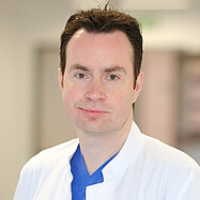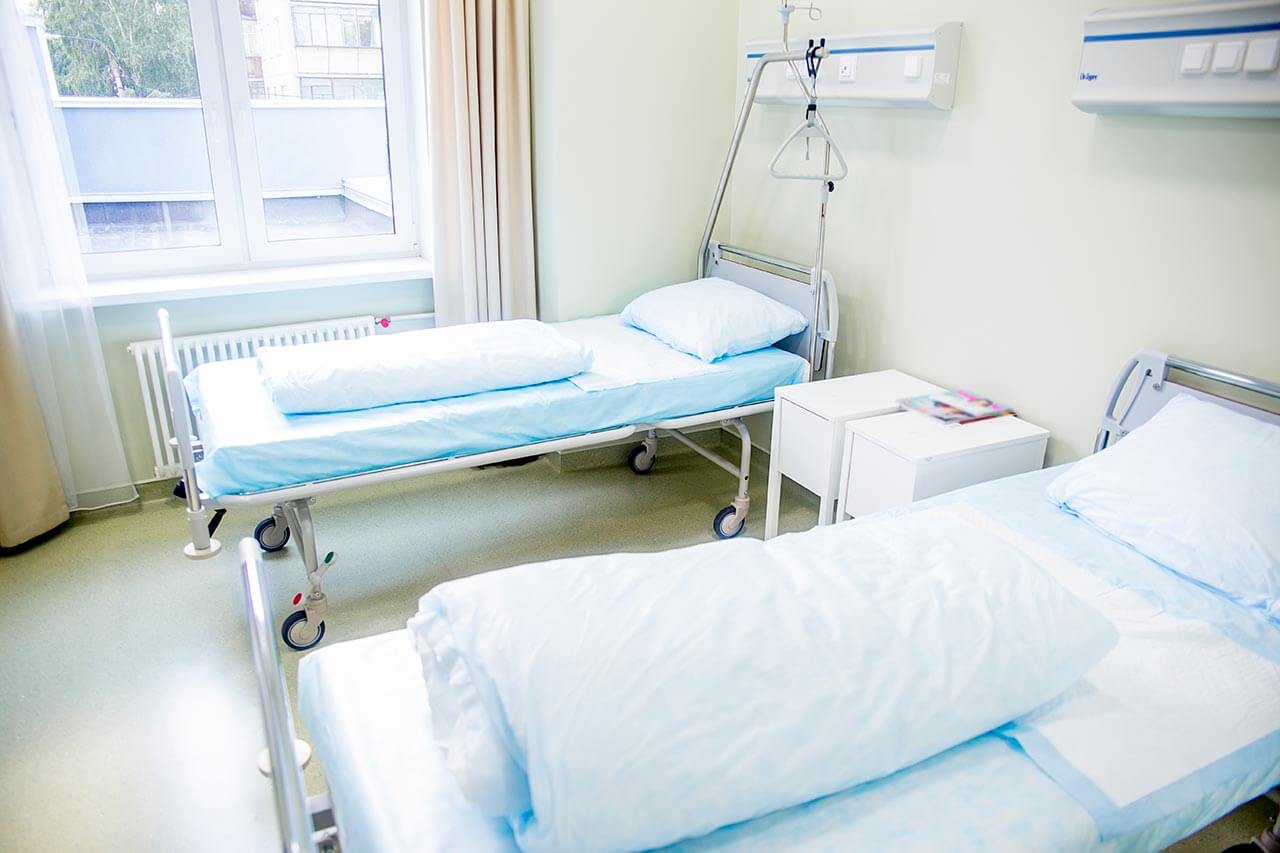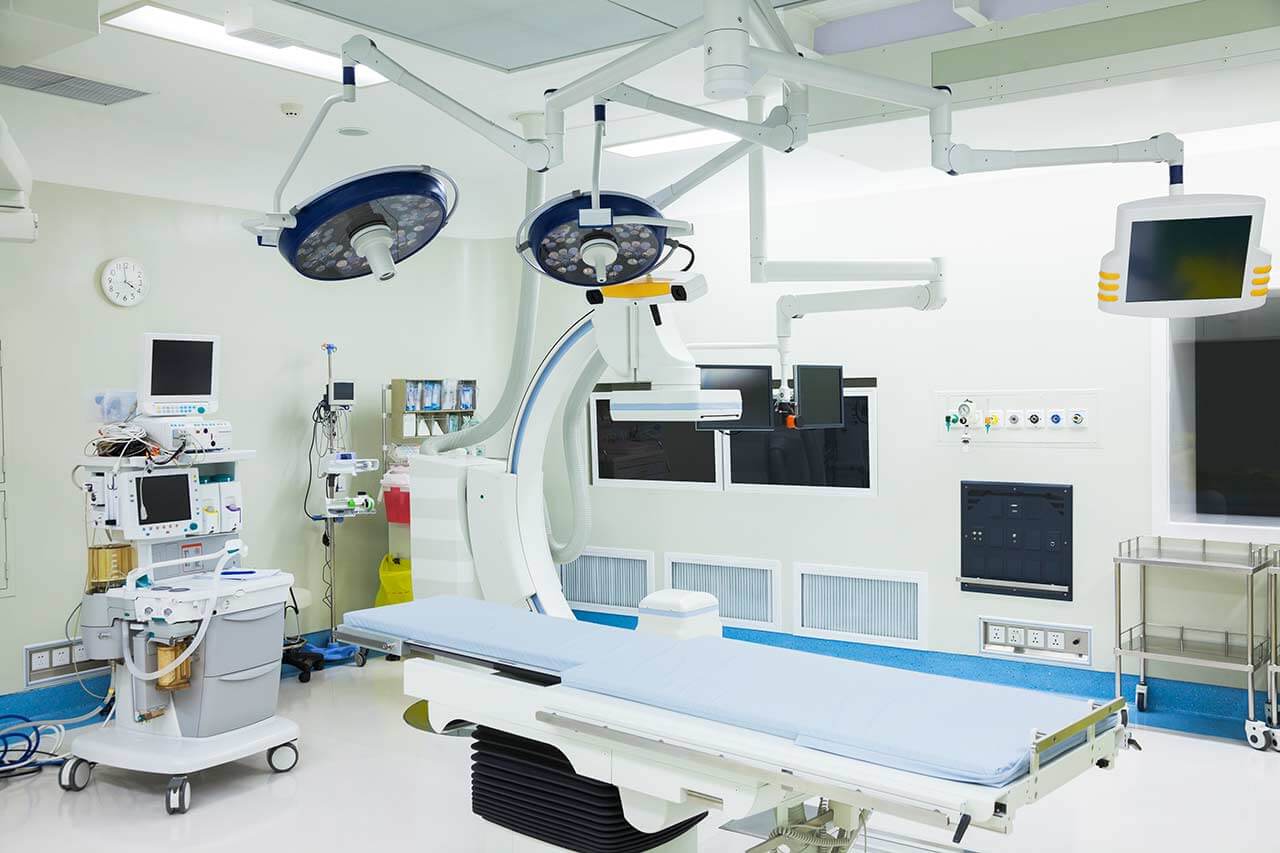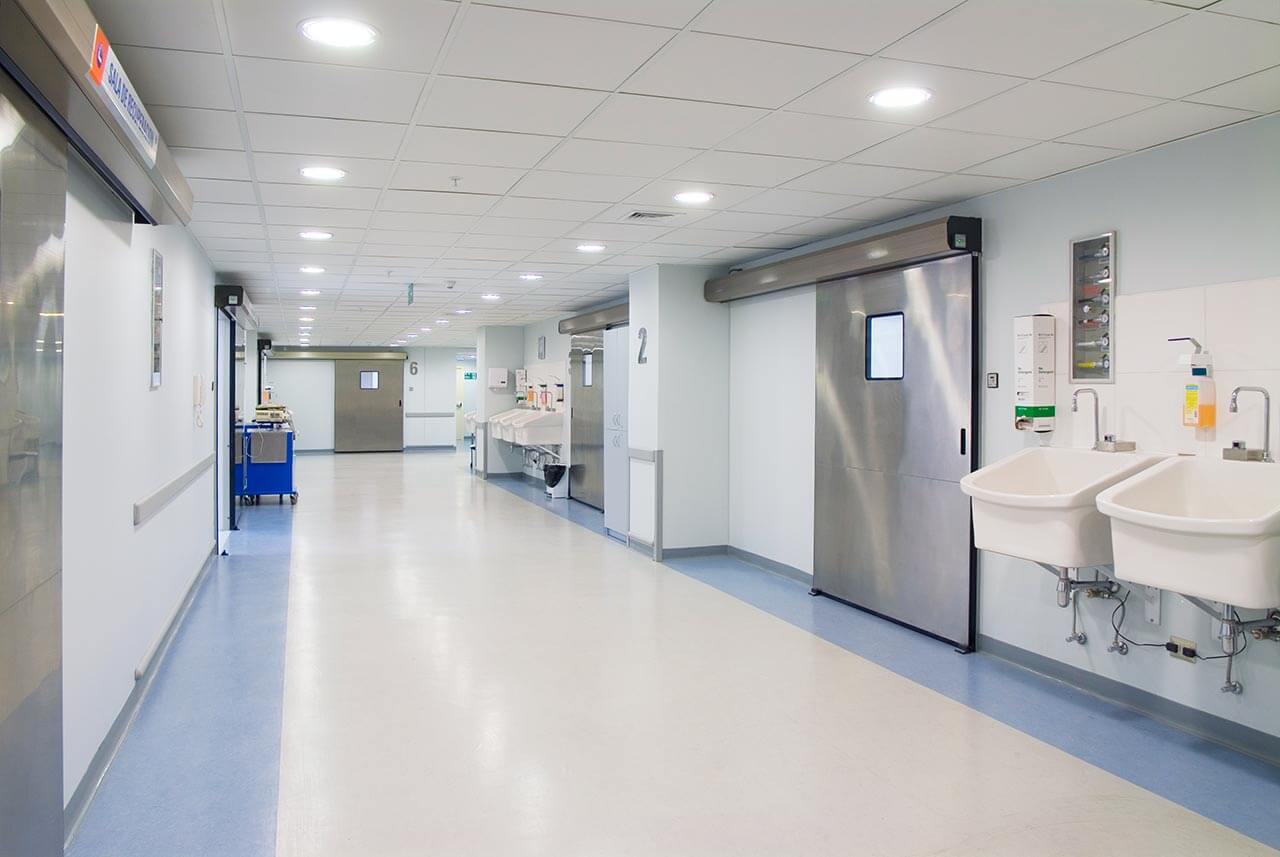
The program includes:
- Initial presentation in the clinic
- clinical history taking
- review of medical records
- physical examination
- laboratory tests:
- complete blood count:
- hemoglobin
- erythrocyte sedimentation rate (ESR)
- hematocrit
- thrombocyte
- uric acid
- LDH
- biochemical analysis of blood
- inflammation indicators (CRP, ESR)
- indicators blood coagulation
- complete blood count:
- abdominal ultrasound
- bone marrow biopsy (if indicated)
- phlebotomy
- nursing services
- full hospital accommodation
- explanation of individual treatment plan
Required documents
- Medical records
- Complete blood count (if available)
Service
You may also book:
 BookingHealth Price from:
BookingHealth Price from:
About the department
The Department of Gastroenterology, Hepatology and Infectology at the University Hospital Oldenburg specializes in the diagnosis and treatment of diseases of the gastrointestinal tract, liver, pancreas, as well as infectious diseases and diabetes mellitus types I and II. The priority clinical activity of the department is the treatment of oncological diseases of the digestive system, which is provided in close cooperation with the Department of General and Abdominal Surgery and the Department of Oncology and Hematology. The department is equipped with modern endoscopy rooms where diagnostic and therapeutic interventional procedures are successfully performed in strict compliance with hygiene and safety standards. Endoscopic diagnosis allows the doctors of the department to assess the condition of the gastrointestinal tract from the inside, and endoscopic treatment of gastroenterological diseases is an excellent alternative to surgery when conservative therapy does not give the desired result. It should be noted that the department has a rich experience in the field of endoscopic treatment of pancreatitis (inflammation of the pancreas) and its complications. The patient's health is in the safe hands of highly competent doctors, who develop an individual treatment regimen for each patient, taking into account their needs and wishes. The Head Physician of the department is Dr. med. Christian Meinhardt.
The gastroenterologists of the department focus on endoscopic examinations and therapeutic manipulations on the esophagus, stomach, small and large intestine, pancreas, liver, and bile ducts. The department's endoscopy rooms are equipped with the latest generation equipment, which contributes to the high efficiency and safety of treatment. The diagnostic capabilities of the department include classical endoscopic examinations with high-resolution scans, such as virtual chromoendoscopy, endosonography with mini-probes, endoscopic ultrasound in longitudinal scanning mode, and capsule endoscopy for the detection of rare diseases of the small intestine. The department offers a variety of examinations for suspected gastrointestinal tumors that, if detected early, can be treated endoscopically without open surgery.
The gastroenterologists of the department perform all currently available therapeutic endoscopic procedures: polypectomy, endoscopic mucosal resection, endoscopic submucosal dissection, radiofrequency ablation, argon plasma coagulation, esophageal variceal ligation, bougienage and dilation for stenosis, stenting, electrohydraulic lithotripsy, and others. For the treatment of urgent clinical conditions, such as gastrointestinal bleeding or acute pancreatitis, the department has a specially trained team of doctors who work around the clock.
In the field of hepatology, the department offers diagnosis and treatment of all liver diseases. Of particular interest are new aspects of the treatment of viral hepatitis B and C. In most cases, drug therapy is used during treatment. In cooperation with the Department of Radiology, the department's doctors also perform interventional procedures under imaging guidance: transarterial chemoembolization for liver tumors, transjugular intrahepatic portosystemic shunting for liver cirrhosis and severe forms of ascites, and selective internal radiation therapy for liver tumors.
The department also treats patients with diabetes mellitus types I and II, complications of diabetes mellitus, especially diabetic foot syndrome. Individual consultations are held here, during which a specialist talks about the importance of blood glucose control, proper nutrition, and answers all questions of interest to the patient. In addition, the department organizes educational seminars and the latest training programs, such as the PRIMAS program, a treatment and education program for patients with type I diabetes mellitus.
The department's range of diagnostic services includes the following:
- Endoscopic examinations
- Gastroscopy and colonoscopy, including chromoendoscopy
- Proctoscopy
- Enteroscopy, including single balloon enteroscopy and capsule endoscopy
- Endoscopic retrograde cholangiopancreatography
- Cholangioscopy
- Endosonography
- Non-endoscopic examinations
- Ultrasound examinations
- Ultrasound examinations of the abdominal cavity with interventional procedures and biopsy
- Contrast-enhanced ultrasound examinations
- Endosonography using longitudinal scanning mode and performing interventional procedures
- Contrast-enhanced endosonography
- Endosonography with a high-resolution mini-probe
- Rectal endosonography with transverse scanning
- Functional diagnostics
- Lactose, lactulose, fructose, and glucose breath tests
- Esophageal manometry
- 24-hour pH-metry
- Esophageal impedance testing
- Comprehensive liver examination, including liver biopsy
- Other diagnostic methods
The department offers the following treatment methods:
- Polypectomy
- Endoscopic mucosal resection
- Endoscopic submucosal dissection
- Endoscopic removal of gastrointestinal malignancies at an early stage
- Radiofrequency ablation for Barrett's esophagus and bile duct tumors
- Argon plasma coagulation
- Esophageal variceal treatment with histoacryl injections or latex ligation
- Bougienage or dilation for stenosis
- Stenting of all sections of the gastrointestinal tract
- Percutaneous transhepatic drainage
- Pancreatic cyst drainage and retroperitoneal endoscopic necrosectomy
- Endoscopic treatment of wounds and abscesses
- Electrohydraulic lithotripsy
- Transarterial chemoembolization for liver tumors
- Transjugular intrahepatic portosystemic shunting for liver cirrhosis and ascites
- Selective internal radiation therapy for liver tumors
- Extracorporeal shockwave lithotripsy for pancreatic stones
- Other therapeutic services
Curriculum vitae
Dr. med. Christian Meinhardt is the Head Physician of the Department of Gastroenterology, Hepatology and Infectology at the University Hospital Oldenburg since August 1, 2019. Previously, he worked as a gastroenterologist in the same department since 2015. Dr. Meinhardt graduated from the Faculty of Medicine of the Otto von Guericke University of Magdeburg, where he received his license to practice medicine in 2006. Dr. Christian Meinhardt completed his preparation for board certification in internal medicine and gastroenterology at the University Hospital Luebeck.
Photo of the doctor: (c) Klinikum Oldenburg AöR
About hospital
The University Hospital Oldenburg is a multidisciplinary medical complex offering top-notch services of the European standard. The hospital has 20 specialized departments, 15 highly specialized centers, and more than 10 institutes. The hospital provides services in almost all areas of modern medicine: general and abdominal surgery, cardiac surgery, orthopedics, traumatology, cardiology, oncology, dermatology, gastroenterology, gynecology, mammology, urology, and pediatric and adolescent medicine.
The hospital has 832 beds, and many diagnostic and therapeutic procedures are performed on an outpatient basis. More than 150,000 patients are treated here annually, 37,000 of them receive medical care in a hospital setting. The medical complex has a highly professional medical team of more than 2,900 employees and most departments are headed by professors with extensive clinical experience.
The hospital is home to one of the best comprehensive cancer centers in Germany (Nordwestdeutsches Tumorzentrum), certified according to the requirements of the German Cancer Society (DKG). The center successfully treats breast cancer, prostate cancer, colorectal cancer, pancreatic cancer, esophageal cancer, head and neck tumors, skin tumors, and other oncological diseases. The center uses modern cancer treatment methods with proven effectiveness and also offers allogeneic and autologous bone marrow transplantation for the treatment of severe hematologic diseases (European certification JACIE).
The University Hospital Oldenburg is an expert medical facility in robotic surgery. The hospital has a specialized da Vinci Surgery Center, where gastrointestinal, urological, and gynecological diseases are treated with excellence. Patients are operated on by highly qualified professors with in-depth expertise and extensive experience in robotic surgery.
The University Hospital Oldenburg is one of the leading medical institutions in Germany because it offers excellent medical and technical resources, qualified personnel, and a comfortable infrastructure designed with the needs of patients in mind. The hospital's physicians treat patients with complex clinical cases and achieve incredible results.
The basis of medical care in the hospital is humane attitude to the patient, empathy and understanding of his needs. During the therapeutic process, the patient is surrounded by care and, if necessary, receives professional psychological support.
Photo: (с) depositphotos
Accommodation in hospital
Patients rooms
The patients at the University Hospital Oldenburg stay in comfortable single, double, and triple rooms. Each patient room has an ensuite bathroom with a toilet and a shower. The patient rooms have a TV, a telephone, and Wi-Fi. The patient rooms in the pediatric departments are designed in an appropriate interior to make the young patients feel as comfortable as possible. A child can stay in the same room with one of the parents.
The hospital has an excellent infrastructure: there is a pharmacy, a hairdresser, an ATM, and a library with audio books, DVD movies, and board games.
Meals and Menus
The hospital offers delicious and balanced meals three times a day: breakfast, lunch, and dinner. Since 2022, a new menu "Vitalessen" has been introduced here, which excludes the addition of preservatives, dyes, and flavor enhancers to food. The menu takes into account all preferences and wishes of the patients.
There is also a cozy cafe in the hospital, where you can enjoy a tasty snack or a cup of aromatic coffee or hot tea with dessert.
Further details
Standard rooms include:
![]() Toilet
Toilet
![]() Shower
Shower
![]() Wi-Fi
Wi-Fi
![]() TV
TV
Religion
There is a chapel on the ground floor of the hospital where Catholic and Evangelical services are held regularly. Services by representatives of other religions are available upon request.
Accompanying person
Your accompanying person may stay with you in your patient room or at the hotel of your choice during the inpatient program.
Hotel
You may stay at the hotel of your choice during the outpatient program. Our managers will support you for selecting the best option.




